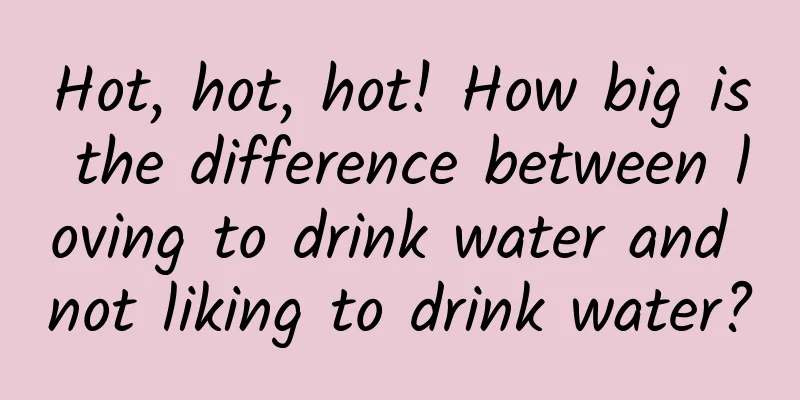Hot, hot, hot! How big is the difference between loving to drink water and not liking to drink water?

|
As the weather gets hotter, "drink more water" has become a health secret for many people. Some time ago, the topic of drinking water also became a hot topic and caused widespread discussion. Some people believe that many people drink too little water, which may have adverse effects on health; while others worry that drinking too much water may also cause health problems. So, what is the truth? What effect does drinking water have on our bodies? And what different effects will it have on our health if we like drinking water or not? Image source: Weibo screenshot Importance of water to the body Water, a simple molecule that makes up about 60% of our human body, actually has a complex mission to sustain life. It is not only a substance that can be found everywhere in our lives, but also an indispensable element to maintain the normal functioning of our body and is vital to our health. First, water has the unique ability to regulate body temperature. Whether it’s helping us stay cool on a hot summer day by dissipating heat through sweat, or maintaining body temperature on a cold winter day, water is our body’s essential thermostat. Secondly, water is a catalyst for metabolism. All hydrolysis reactions, whether it is the decomposition of protein, carbohydrates or fat, cannot be separated from the participation of water, which helps these substances to be converted into energy and raw materials that the body can use. More importantly, water maintains the homeostasis of our body. It is not only responsible for delivering nutrients to every cell, but also transporting waste out of the cell, ensuring smooth blood circulation, thus supporting the normal function of every organ and tissue in the body. Water is also important in terms of lubrication and cushioning. It combines with sticky molecules to form lubricating fluids in joints, the digestive tract, the respiratory system, and the reproductive system, while also acting as a buffer by maintaining the shape of cells when we walk or move, protecting sensitive areas such as the brain, spinal cord, and fetus. Electrolyte balance is also inseparable from water. Sodium, potassium, calcium and other minerals that are vital to the heart, muscles and nervous system need sufficient water to maintain their balance. Lack of water will disrupt this balance and affect the normal functioning of the body. In addition, water is essential for skin health. It helps maintain skin's elasticity and moisture, reduces the appearance of wrinkles, and makes skin look younger and healthier. Copyright images in the gallery. Reprinting and using them may lead to copyright disputes. Potential risks of not liking to drink water Although drinking water seems to be a trivial thing in daily life, not liking to drink water may indeed bring potential risks to our health that cannot be ignored. 1. The impact on kidney health is particularly significant. The kidneys are our body's "filters" responsible for removing waste and excess water from the blood. When the amount of water consumed is insufficient, the urine becomes more concentrated, which increases the risk of urinary stones. Maintaining adequate water intake can reduce the risk of initial and recurring urinary stones. 2. Water intake is also crucial for the digestive system. Water not only helps digest food, but is also a key component in the formation of healthy stool. When the body lacks sufficient water, the large intestine absorbs water from the stool to replenish the body's water needs, which can cause constipation. Constipation is not only uncomfortable, but can also cause gastrointestinal discomfort, hemorrhoids, and other digestive system-related problems. 3. Proper water intake is also extremely important for brain function. Studies have shown that even a slight dehydration state (water loss of more than 1% of body weight) can affect a person's attention, memory and other cognitive functions. This is because water directly affects the functioning of the nervous system, including the synthesis and release of neurotransmitters in the brain. 4. The skin is a reservoir of water, and water helps the skin perform its functions better. Lack of water will make the skin dry and rough, and damage the skin barrier. Overall, a water-deprivation habit can lead to a host of health problems, from kidney disease to digestive distress to decreased cognitive function. Therefore, understanding and being aware of the importance of proper water intake is crucial to maintaining overall health. By making simple changes to our daily water habits, we can significantly reduce these health risks and enjoy a healthier, more active lifestyle. How to drink water properly Finding the right balance of drinking water? After discussing the importance of drinking water and the risks of insufficient drinking, we also need to understand how to drink water correctly. So, how much water should a normal person drink every day? The Dietary Guidelines for Chinese Residents (2022) recommends that in mild climates, adult men drink 1,700 ml of water per day and adult women drink 1,500 ml of water per day, divided into multiple portions. However, the specific amount of water you need will vary depending on your activity level, living environment, and health status. Therefore, we need to learn to adjust our water intake based on our actual conditions. First, we need to realize that everyone's water needs are different. The amount of water you drink is affected by many factors, such as age, gender, weight, activity level, and environmental conditions. For example, people who are heavier or live in tropical climates may need more water than the standard to replace the water lost through sweat; athletes' water needs increase significantly during training to help muscle recovery and prevent dehydration; pregnant women also need more water because of amniotic fluid and the fetus. Copyright images in the gallery. Reprinting and using them may lead to copyright disputes. Secondly, being able to recognize your body's thirst signals is key to maintaining water balance. Thirst is a complex physiological response that indicates that our body needs to be hydrated. To effectively recognize thirst, you can pay attention to some common signs, such as dry mouth, dry tongue, and mild headaches. However, by the time you feel thirsty, you may already be mildly dehydrated. Therefore, drinking water regularly, especially when you are active, can help us avoid reaching this state. Again, it is equally important to avoid excessive drinking. Although dehydration is harmful, excessive water intake can also lead to water intoxication, that is, the sodium level in the body is dangerously reduced due to excessive dilution. Although this situation is rare, it is also necessary to be vigilant. For example, people with poor kidney function or after sweating a lot are not recommended to drink a lot of water quickly. You should grasp the rhythm of drinking water. Finally, we should apply this knowledge to our daily lives, such as setting regular drinking times, using apps or smart water bottles to track water intake, and ensuring we get enough water during daily activities, especially during exercise or in hot environments. In summary, finding your personal hydration balance means understanding and responding to your body’s needs, not only in terms of the appropriate amount of water to drink, but also when and how to hydrate. In this way, we can maintain our bodies’ optimal function, supporting our overall health and vitality. References [1] Du Binhua, Reheman Aila, Chen Qi, Xie Rui, Huang Yadong, Huang Wenshu. Composition and content analysis of main carotenoids in Kumaiti apricot[J]. Food Science, 2019, 40(18): 189-194. [2]Liska D, Mah E, Brisbois T, et al. Narrative Review of Hydration and Selected Health Outcomes in the General Population. Nutrients. 2019;11(1):70. Planning and production Author: Jiang Yongyuan, Internal Medicine Doctor Review丨Zhang Yu, researcher/PhD, Chinese Center for Disease Control and Prevention, national health science expert Planning丨Zhong Yanping Editor: Zhong Yanping Proofread by Xu Lailinlin |
<<: Choice is more important than hard work? How to keep your job in the AI era?
>>: Smart revolution in the forest? This "robot" is going to work in the forest!
Recommend
CVPR: CVPR 2022 received 8,161 submissions from 23,389 authors, with China ranking first in submissions
CVPR Express: China has the highest number of sub...
Hangzhou Internet Entrepreneurship Guide 3.0 2015
[[152981]] This Hangzhou Internet Entrepreneurshi...
Night Grass and Chollima 7-day Case Study Practice Training Camp 17th
Resource introduction of the 17th issue of the Ni...
Which is better, vitamin C that costs 2 yuan or vitamin C that costs hundreds of yuan?
Speaking of vitamin C, many people think it is a ...
How to increase followers and monetize by creating short videos!
1141.3W, on Kuaishou, this fan base exceeds that ...
How to do competitive product analysis report as a workplace rookie!
Recently, a netizen complained to Clippings that ...
In the era of the short video red ocean, how do companies formulate growth strategies?
Table of contents: Definition of concepts Short v...
How terrifying is the anti-human weapon known as the "fireworks of death" - the "white phosphorus bomb"?
When the white phosphorus bomb is dropped, a clou...
Paid promotion-detailed explanation of advertising!
Before writing the whole article, I organized a g...
Nanjing 90-minute tea tasting studio [2022 highly recommended]
Nanjing tea drinking resource reservation, Nanjin...
Prepare for 618! The latest Baidu search & information flow advertising guide!
The biggest e-commerce promotion in the first hal...
The fan conversion rate reaches 40%, promotion tips for wedding photography during the peak season!
Just one week after the Chinese Valentine's D...
How to operate products in a “gamified” way?
When it comes to playing games, everyone must be ...
Tips for building the underlying framework for event operations!
Regarding event operation , many operators are fa...
Brand KOL marketing and growth!
Internet celebrities are the leverage of products...






![[Bai Gu Jing] Xue Han's advanced study of the Chaos Theory of Stocks: Chaos Theory's price comparison relationship - the secret of sector rotation 8 episodes](/upload/images/67cc2df0e1435.webp)


